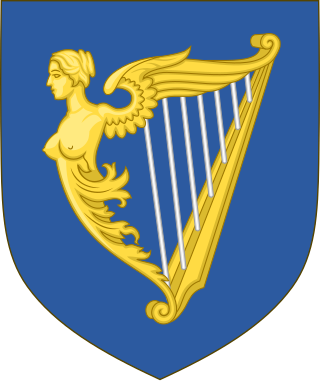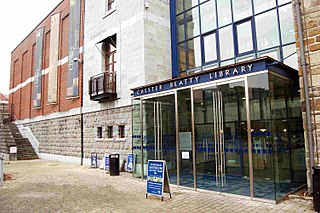| |||||
| Centuries: | |||||
|---|---|---|---|---|---|
| Decades: | |||||
| See also: | Other events of 1551 List of years in Ireland | ||||
Events from the year 1551 in Ireland.
| |||||
| Centuries: | |||||
|---|---|---|---|---|---|
| Decades: | |||||
| See also: | Other events of 1551 List of years in Ireland | ||||
Events from the year 1551 in Ireland.

A book is a medium for recording information in the form of writing or images, typically composed of many pages bound together and protected by a cover. It can also be a handwritten or printed work of fiction or nonfiction, usually on sheets of paper fastened or bound together within covers. The technical term for this physical arrangement is codex. In the history of hand-held physical supports for extended written compositions or records, the codex replaces its predecessor, the scroll. A single sheet in a codex is a leaf and each side of a leaf is a page.

A ballad is a form of verse, often a narrative set to music. Ballads derive from the medieval French chanson balladée or ballade, which were originally "dance songs". Ballads were particularly characteristic of the popular poetry and song of Britain and Ireland from the Late Middle Ages until the 19th century. They were widely used across Europe, and later in Australia, North Africa, North America and South America.

In publishing, printers are both companies providing printing services and individuals who directly operate printing presses.

The Irish House of Commons was the lower house of the Parliament of Ireland that existed from 1297 until 1800. The upper house was the House of Lords. The membership of the House of Commons was directly elected, but on a highly restrictive franchise, similar to the unreformed House of Commons in contemporary England and Great Britain. Catholics were disqualified from sitting in the Irish parliament from 1691, even though they comprised the vast majority of the Irish population.

The Chester Beatty Library, now known as the Chester Beatty, is a museum and library in Dublin. It was established in Ireland in 1953, to house the collections of mining magnate, Sir Alfred Chester Beatty. The present museum, on the grounds of Dublin Castle, opened on 7 February 2000, the 125th anniversary of Beatty's birth and was named European Museum of the Year in 2002.

A pamphlet is an unbound book. Pamphlets may consist of a single sheet of paper that is printed on both sides and folded in half, in thirds, or in fourths, called a leaflet or it may consist of a few pages that are folded in half and saddle stapled at the crease to make a simple book.
The Irish Examiner, formerly The Cork Examiner and then The Examiner, is an Irish national daily newspaper which primarily circulates in the Munster region surrounding its base in Cork, though it is available throughout the country.

James Fitzpatrick is an Irish artist. He is best known for elaborately detailed work inspired by the Irish Celtic artistic tradition. However, his most famous single piece is a two-tone portrait of Che Guevara created in 1968, based on a photo by Alberto Korda.

Bookselling is the commercial trading of books which is the retail and distribution end of the publishing process.
Trafford Publishing is a company for self-publishing using print-on-demand technology, formerly based in Victoria, British Columbia, Canada, and now based in Bloomington, Indiana, US.
Events from the year 1700 in Ireland.

Early Modern Irish represented a transition between Middle Irish and Modern Irish. Its literary form, Classical Gaelic, was used in Ireland and Scotland from the 13th to the 18th century.

The Library of Trinity College Dublin serves Trinity College. It is a legal deposit or "copyright library", under which, publishers in Ireland must deposit a copy of all their publications there, without charge. It is the only Irish library to hold such rights for works published in the United Kingdom.
Philip O'Sullivan Beare was a military officer descended from the Gaelic nobility of Ireland, who became more famous as a writer. He fled to Habsburg Spain during the time of Tyrone's Rebellion, when the Irish clans and Gaelic Ireland were making their last stand against Tudor England. He subsequently authored the book, the Catholic History of Ireland, which offered a history from the perspective of the native Irish Catholic population.
The Reformation in Ireland was a movement for the reform of religious life and institutions that was introduced into Ireland by the English administration at the behest of King Henry VIII of England. His desire for an annulment of his marriage was known as the King's Great Matter. Ultimately Pope Clement VII refused the petition; consequently, in order to give legal effect to his wishes, it became necessary for the King to assert his lordship over the Catholic Church in his realm. In passing the Acts of Supremacy in 1534, the English Parliament confirmed the King's supremacy over the Church in the Kingdom of England. This challenge to Papal supremacy resulted in a breach with the Catholic Church. By 1541, the Irish Parliament had agreed to the change in status of the country from that of a Lordship to that of Kingdom of Ireland.

The following outline is provided as an overview of and topical guide to books:
Mercier Press is a publisher based in Cork, Ireland. It is the longest established independent Irish publishing house.
Loígis is the name of an Irish tribe, as it is called by contemporary scholars. Formerly, scholars generally called the tribe Laoighis or Laeighis in Irish, Lagisia in Latin, and Leix in English. Loígis is also the name of the territory in western Leinster that the tribe settled during the third century AD, and of the minor kingdom that the Loígis chieftains ruled until 1608. County Laois derives its name from Loígis, although the present county encompasses baronies that were not traditionally part of the territory of Loígis.

Aibidil Gaoidheilge agus Caiticiosma is the first book printed in Ireland in the Irish language. Meant as a Protestant primer, the book was written by John Kearney, a treasurer of St. Patrick's Cathedral, Dublin. It includes a short section on the spelling and sounds of Irish. The production of this book was part of a larger endeavour by Irish Protestants to print the Bible in the Irish language so that the common person could read it. The book was printed on a press which was set up in the home of Alderman John Ussher. Ussher, who was a well-known Dublin Protestant, also paid for the venture. Though the printer's identity is unknown, it is possible that William Kearney, a nephew of John Kearney was the printer. 200 copies of the book were printed but only four known copies exist today. In 1995 a copy of the book was bought by Trinity College Library Dublin for £47,700 ($76,463) at Christie's.

Books in the United Kingdom refers to books in the United Kingdom. In other words, "written or printed work consisting of pages glued or sewn together along one side and bound in covers", in the United Kingdom, a country, in the world. What follows is a meagre and entirely inadequate coverage of the subject for purposes unknown.